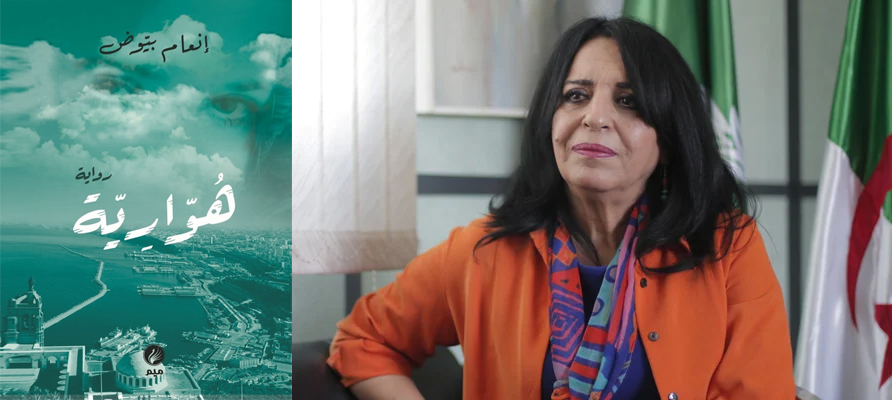On the left, “Houaria” (MIM Edition, 2023) by Inaam Bayoud. On the right, a web-based photograph of Inaam Bayoud.
A familiar debate has critics and writers up in arms in the Arab world once again: What place does ‘taboo’ have in art? Ethics, morality, and the sensibilities of the contemporary age are yet more factors that play into creative production these days. Arguably, this development is far from new; one need only look at ongoing criticisms of skewed literary prize committee decisions and the numerous cases of film festival censorship in the past decade and more.
In the Arab world, going any length without hearing news about the latest uproar or controversy within cultural circles has become a rarity. The newest debate emerged over this year’s recipient of the Assia Djebar Grand Prize for Novel, “Houaria” (MIM Edition, 2023), by Algerian writer and critic Inaam Bayoud. Numerous critics have scorned its awarding due to the author’s use of “vulgar” and “obscene” language in parts of the novel.
The novel unfolds the story of a fortune-teller named Houaria. With chapters named after each character, “Houaria” delves into the stories of people ranging from all corners of Algeria’s social strata like Heba, a researcher; Hani, who has fallen in love with Heba, yet is socially outclassed by her; and Hediya and her extramarital affair with her lover Hashemi, a doctor. Through both setting and characters, Bayoud does not shy away from commentary on social and moral corruption, the collapse of values, or the loss of humanity, as shown through dialogue, depictions of “disreputable” places, or violent events. Lana Abdel Rahman, who reviews the novel in Independent Arabia, writes: “Ugliness in the novel shows the significant disparity between the cultural level and different aesthetic visions, which is considered “ugly” in a particular context and may carry deep aesthetic connotations in another context.”
Ironically, “ugliness” has been the main criticism against the novel, particularly the author’s use of vulgar language in the Algerian Arabic Darija dialect, which Arab News describes as “replete with sexual innuendo.” Controversy sparked on social media following the award announcement in early July as users blasted segments of the novel online. Siham Boughrara criticizes scenes of the story as “nothing but an immoral, disastrous, pornographic act that does not represent Algeria as a conservative Muslim country. It is only evidence of the incompetency of the publishing house.” Activist Salah Eddin Gharib suggests on social media that criticisms of the book are “free advertising and a consecration of mediocrity,” condemning the novel’s sexual contents as “shameful” and suggesting that “writing about the forbidden trinity (religion, politics, and sex) is an old method followed by those seeking fame,” as cited by Majida Zouein in Raseef 22.
Excerpted from Naomi Pham's “Novel 'Houaria' Forces Algerian Critics into a Literary-Ideological Battle Armed with Morality and Ethics,” which appeared in Al Jadid Magazine, Vol. 28, No. 85, 2024 and Inside Al Jadid Reports, No. 90, 2024.
Copyright © 2024 AL JADID MAGAZINE

